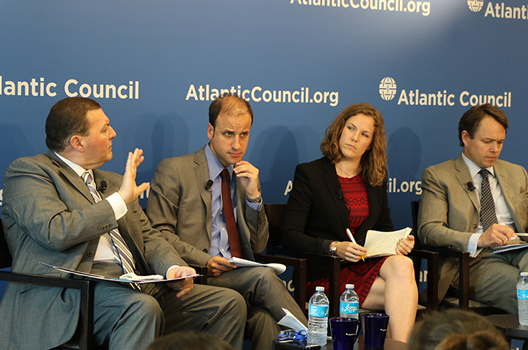 True national reconciliation and inclusiveness are necessary ingredients for ending the cycle of statelessness and radicalization that has created a fertile ground for terrorist groups, including the Islamic State of Iraq and al-Sham (ISIS), to flourish in Libya, according to a new Atlantic Council report.
True national reconciliation and inclusiveness are necessary ingredients for ending the cycle of statelessness and radicalization that has created a fertile ground for terrorist groups, including the Islamic State of Iraq and al-Sham (ISIS), to flourish in Libya, according to a new Atlantic Council report.
“People who fought in Syria, we call that the undergrad for jihad, they went to Libya to get their post-grad degree in jihad,” said Jason Pack, founder of Eye on ISIS in Libya and executive director of the US-Libya Business Association.
“By coming from what they gathered in Syria to their post-grad in Derna and Sirte they founded their own brigades,” said Pack referring to mostly Tunisian jihadis who initially trained in Syria where a civil war has raged for the past six years. “The porosity of the Tunisian-Libyan border has been a real plague for Libya, and it has been a plague for Tunisia,” he added, pointing to high-profile terrorist attacks in Tunisia in 2015 at the Bardo National Museum in Tunis and on British holidaymakers in Sousse.
Pack participated in a panel discussion at the Atlantic Council in Washington on June 20 with Rhiannon Smith, managing director at Eye on ISIS in Libya; and Christopher Chivvis, associate director of the International Security and Defense Policy Center at the RAND Corporation. Karim Mezran, a senior fellow with the Atlantic Council’s Rafik Hariri Center for the Middle East, moderated the discussion. Pack, Smith, and Mezran are the authors of an Council’s report: The Origins and Evolution of ISIS in Libya.
Pack underscored the flexibility of jihadist groups, like ISIS, noting that “its genius is its constant mutation.” He added that it is “extremely easy to jump from one [group] to another,” as many followers are uncertain about the specifics of each organization.
According to Pack, jihadists also pledge their allegiance to one local commander, meaning that “loyalty is at a local level.” This, along with the blurred lines between organizations, creates a situation that ISIS has exploited to infiltrate Libya as the state has a “gap in territoriality” and “no sovereignty,” he said.
Libya has been in a state of chaos since its longtime leader, Moammar Gadhafi, was ousted and later killed in an Arab Spring uprising in 2011. The North African nation today has two governments—an internationally recognized one based in the capital, Tripoli, and a second in the city of Tobruk; and is awash in weapons and rival militias.
ISIS is “a symptom of Libya’s problem” rather than a cause, said Smith, noting that it was due to the state’s lack of governance, institution, and security that ISIS has been able to regain a foothold in the region.
Smith said ISIS’ use of violence has “created a significant reaction” in Libya where “the majority of Libyans do not support ISIS.”
Chivvis focused on the need for both political and military intervention in Libya. “ISIS actively sought to build a second front in Libya,” he said. “This means that there is an active role for the military,” he added.
In the summer of 2016 and in January 2017, the United States carried out drone strikes in Libya aimed at ISIS targets.
Chivvis, however, warned that counterterrorism operations need to be effective, but they cannot “undermine the broader objectives that are trying to be achieved.” While he agreed that a “bottom-up approach to Libya’s political fracture” is the best solution, he said it is extremely difficult for other countries to work with local governments.
Pack said foreign governments must provide “small injections of targeted capacity-building programs which empower Libyan actors themselves to fill vacuums.” Given that vacuums cause vulnerabilities in Libya, the elimination of governance gaps means that “the jihadists can’t nest,” he said.
Such an approach begins with cooperation within Libya; the international community must “help legitimize municipal institutions” and view them as “successes to build on, and not obstacles to overcome,” Pack said.
Xiaojing Zeng is a communications intern at the Atlantic Council.
Image: (from left) Karim Mezran, senior fellow with the Atlantic Council's Rafik Hariri Center for the Middle East, moderated a discussion with Jason Pack, founder and director of Eye on ISIS in Libya and executive director of US Libya Business Association; Rhiannon Smith, managing director of Eye on ISIS in Libya; and Christopher Chivvis, associate director of the International Security and Defense Policy Center and senior political scientist at RAND Corporation. (Atlantic Council)
